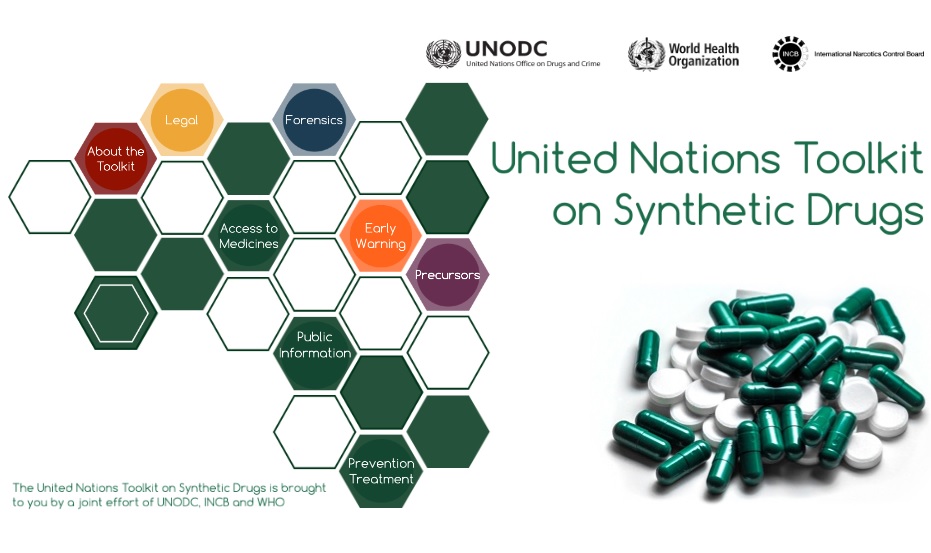UNODC launched the United Nations Toolkit on Synthetic Drugs, a web-based platform with a wide range of electronic resources that offer innovative and practical tools on how to approach challenges related to synthetic drugs and particularly opioids.
The toolkit is part of UNODC’s Integrated Opioid Strategy that was launched last year to deal with the deadly opioid crisis. UNODC is the lead UN Secretariat entity in providing assistance to Member States in addressing the world drug problem and in collaboration with the World Health Organization (WHO), the International Narcotics Control Board (INCB) and other international and regional organizations is coordinating the development of this toolkit to support countries in addressing the threat of synthetic drugs.
The Toolkit offers a selection of different topics critical in addressing the key challenges presented by synthetic drugs. Generally, these topics range from legislative approaches, forensic capacity, prevention, treatment and rehabilitation, and access to medicines to regulation, detection and interdiction. Currently, three modules are complete and accessible: Legal, Forensics and Precursors. The remaining modules are in development and will become available soon. Moreover, the toolkit will be frequently updated and complemented with additional resources.
The toolkit was formally presented by Justice Tettey, Chief of UNODC’s Laboratory and Scientific Section, at a side event during the 62nd session of the Commission on Narcotic Drugs (CND), co-organized by the governments of Canada, Columbia and the United States of America.
 Mr. Tettey, Chief of UNODC’s Laboratory and Scientific Section, underlined, “the toolkit has been developed in an interactive and user-friendly way for the benefit of Member States. You can have a toolkit in your pocket.” The U.S. Head of Delegation to the CND’s 62nd Regular Session, Mr. James A. Walsh highlighted the fact that “as an online platform, the toolkit will serve as a self-assessment tool that allows countries to identify and address the specific synthetic drug challenges they are facing.”
Mr. Tettey, Chief of UNODC’s Laboratory and Scientific Section, underlined, “the toolkit has been developed in an interactive and user-friendly way for the benefit of Member States. You can have a toolkit in your pocket.” The U.S. Head of Delegation to the CND’s 62nd Regular Session, Mr. James A. Walsh highlighted the fact that “as an online platform, the toolkit will serve as a self-assessment tool that allows countries to identify and address the specific synthetic drug challenges they are facing.”
Over the past 150 years, humanity has experienced several opioid crises, but none as devastating as the present one. Opioids remain one of the most important classes of medicines, providing essential pain relief and palliative care for many millions of people in need. But the deadly consequences of non-medical use pose some of the greatest drug challenges we face today.
The Toolkit is available following this link>>>

